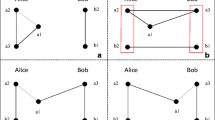Abstract
Quantum Key Agreement (QKA) is an important branch of quantum cryptography, which uses the characteristics of quantum entanglement to ensure security of the key. The multi-party quantum key agreement requires all communicants to exert the same influence on the result of the protocol, and the key cannot be determined individually. Most of the MQKA protocols that have been proposed are based on a single particle or Bell state, where each particle corresponds to only one classical bit. This paper proposes a multi-party QKA protocol based on the GHZ-like state and χ+ state, which can realize that each particle corresponds to 1.5 classical bits. The security of the protocol is guaranteed by the uncertainty of the measurement results of entanglement swapping. The results show that the proposed multi-party QKA protocol is secure, fair, and efficient, which can be implemented with existing physical technology. In addition, it is simpler and less computational in the proposed MQKA protocol.


Similar content being viewed by others
References
Ekert, A.K.: Quantum cryptography based on Bell’s theorem. Phys. Rev. Lett. 67, 661–663 (1991)
Bennett, C.H.: Quantum cryptography using any two nonorthogonal states. Phys. Rev. Lett. 68, 3121–3124 (1992)
He, Y.F., Ma, W.P.: Quantum key agreement protocols with four-qubit cluster states. Quantum Inf.Process. 14(9), 3483–3498 (2015)
He, Y.F., Ma, W.P.: Two-party quantum key agreement against collective noise. Quantum Inf. Process. 15(12), 5023–5035 (2016)
Zhou, Y.H., Tan, J., Zhang, J., Shi, W.M., Yang, Y.G.: Three-Party Quantum Key Agreement Protocol Based on Continuous Variable Single-Mode Squeezed States. Commun. Theor. Phys. 71(12), 1448–1454 (2019)
Zhu, Z.C., Hu, A.Q., Fu, A.M.: Improving the security of protocols of quantum key agreement solely using bell states and bell measurement. Quantum Inf. Process. 14(11), 4245–4254 (2015)
Curty, M., Santos, D.J.: Quantum authentication of classical messages [J]. Phys. Rev. A. 64(6), 062309 (2001)
Zhou, N., Wang, L., Gong, L., Zuo, X., Liu, Y .: Quantum deterministic key distribution protocols based on teleportation and entanglement swapping [J]. Opt. Commun. 284(19), 4836–4842 (2011)
Wang, L., Zhao, S.: Round-robin differential-phase-shift quantum key distribution with heralded pair-coherent sources. Quantum Inf. Process. 16(4), 100–115 (2017)
Gao, F., Qin, S.J., Guo, F.Z., et al.: Dense-coding attack on three-party quantum key distribution protocols. IEEE J. Quantum Electron. 47(5), 630–635 (2011)
Gao, F., Guo, F.Z., Wen, Q.Y., et al.: Quantum key distribution by constructing nonorthogonal states with bell states. Int. J. Mod. Phys. B. 24(23), 4611–4618 (2010)
Zhao, Z.W., Luo, Y., Zhao, Z.J., Long, H.M.: A secure quantum key distribution scheme based on variable quantum encoding algorithms. Chin. Opt. Lett. 9(3), 032702–032704 (2011)
Gao, F., Qin, S.J., Wen, Q.Y., Zhu, F.C.: Cryptanalysis of multiparty controlled quantum secure direct communication using Greenberger–Horne–Zeilinger state. Opt. Commun. 283(1), 192–195 (2010)
Chang, Y., Xu, C.X., Zhang, S.B., Yan, L.L.: Quantum secure direct communication and authentication protocol with single photons [J]. Chin. Sci. Bull. 58(36), 4571–4576 (2013)
Zhang, M., Li, H.: Weak blind quantum signature protocol based on entanglement swapping. Photonics Res. 3(6), 324–328 (2015)
Zhou, N., Zeng, G., Xiong, J.: Quantum key agreement protocol. Electron. Lett. 40(18), 1149–1150 (2004)
Hsueh, C.C., Chen, C.Y .: Quantum key agreement protocol with maximally entangled states [C].Proceedings of the 14th information security conference,T aipei, 236–242 (2004)
Tsai, C.W., Hwang, T.: On Quantum Key Agreement Protocol. Technical Report C-S-I-E, NCKU, Taiwan (2009)
Chong, S.K., Hwang, T.: Quantum key agreement protocol based on BB84. Opt. Commun. 283, 1192–1195 (2010)
Shi, R.H., Zhong, H.: Multi-party quantum key agreement with bell states and bell measurements. Quantum Inf Process. 12, 921–932 (2013)
Liu, B., Gao, F., Huang, W., Wen, Q.-Y.: Multiparty quantum key agreement with single particles. Quantum Inf. Process. 12, 1797–1805 (2013)
Sun, Z., Zhang, C., Wang, B., Li, Q., Long, D.: Improvements on multiparty quantum key agreement with single particles. Quantum Inf. Process. 12, 3411–3420 (2013)
Wang, P ., Sun, Z.W., Sun, X.Q.: Multi-party quantum key agreement protocol secure against collusion attacks. Quantum Inf. Process 16, 170–180 (2017)
Min, S.Q., Chen, H.Y., Gong, L.H.: Novel Multi-Party Quantum Key Agreement Protocol with G-Like States and Bell States. Int. J. Theor. Phys. 57(6), 1811–1822 (2018)
Z. Zhao, T. Yang, Z.-B. Chen, J. Du, and J.-W. Pan.: Deterministic and Highly Efficient Quantum Cryptography with Entangled Photon Pairs. arXiv:quant-ph/0211098 (2002)
Cabellon, A.: Quantum key distribution in the Holevo limit. Phys. Rev. Lett. 85, 5635–5638 (2000)
Deng, F.G., Long, G.L., Wang, Y., Xiao, L.: Increasing the efficiencies of random-choice-based quantum communication protocols with delayed measurement. Chin. Phys. Lett. 21, 2097–2100 (2004)
Liu, B., Xiao, D., Jia, H.Y ., Liu, R.Z.: Collusive attacks to “circle-type” multi-party quantum key agreement protocols. Quantum Inf. Process 15, 2113–2124 (2016)
Lin, J., Hwang, T.: New circular quantum secret sharing for remote agents. Quantum Inf. Process. 12, 685–697 (2013)
Acknowledgements
This work is supported by the National Natural Science Foundation of China under Grant No. 6217070290 and Shanghai Science and Technology Project in 2020 under Grant No.20040501500.
Author information
Authors and Affiliations
Contributions
Hang Gao and Ri-Gui Zhou conceived the theory and designed the protocol. Xiaoxue Zhang wrote the paper and contributed security analysis.
Corresponding author
Ethics declarations
Conflict of Interest
The authors declare that there is no conflict of interest.
Code Availability
Not applicable.
Additional information
Publisher’s Note
Springer Nature remains neutral with regard to jurisdictional claims in published maps and institutional affiliations.
Rights and permissions
About this article
Cite this article
Gao, H., Zhou, RG. Multi-Party Quantum Key Agreement Protocol Based on G-Like States and χ+ States. Int J Theor Phys 61, 16 (2022). https://doi.org/10.1007/s10773-022-05011-2
Received:
Accepted:
Published:
DOI: https://doi.org/10.1007/s10773-022-05011-2




